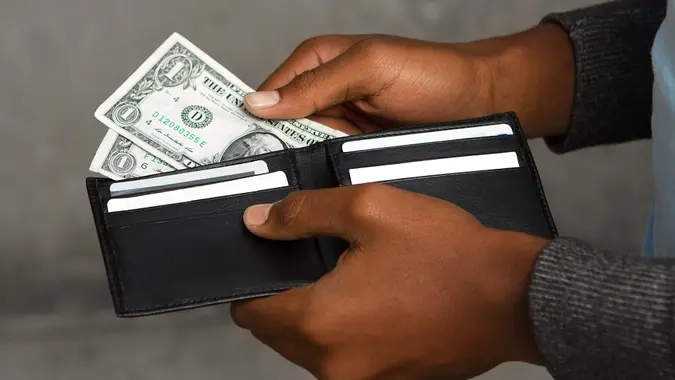Why You Need To Be Involved in Your Family’s Finances

Commitment to Our Readers
GOBankingRates' editorial team is committed to bringing you unbiased reviews and information. We use data-driven methodologies to evaluate financial products and services - our reviews and ratings are not influenced by advertisers. You can read more about our editorial guidelines and our products and services review methodology.

20 Years
Helping You Live Richer

Reviewed
by Experts

Trusted by
Millions of Readers
In today’s “Financially Savvy Female“ column, we’re exploring some of the reasons it’s so important for all women to be involved in their household’s financial planning.
What Money Topics Do You Want Covered? Ask the Financially Savvy Female
According to a recent report by UBS, only 20% of couples participate equally in financial decisions, with 7 in 10 men taking the lead on long-term financial decisions. However, it’s not in your best interest to take a backseat when it comes to managing family finances — here’s why.
You Should Always Be Prepared for the Worst-Case Scenario
Some women are not active participants in their household finances simply because they don’t have an interest. That was the case for a client of Tiffany Welka, financial advisor and accredited wealth management advisor at VFG Associates. Welka shared that her client, a professional surfer, managed all of the family’s finances because his wife “really had no interest in investing or the finances of the household. She trusted that her husband was doing everything that needed to be done financially for their family.”
But when her husband was in a debilitating surf accident, the wife had no idea what to do.
“His wife was in such a tumultuous state — emotional because of the emergency, scared for her husband, anxious about what the future held for their family. Because she did not know much about their family finances, she was unsure what to do and where to start to make sure that their bills were paid,” Welka said. “This made the situation so much more difficult.”
Welka always tells her clients that both people in the relationship should have an understanding of the income, expenses and investments in their household, and have a plan to ensure that in the event of an emergency, the other person can confidently pick up wherever the primary financial officer of the family left off.
“My client ended up having a full recovery. And now, they spend time together each month reviewing their household finances, so they are both on the same page,” Welka said. “The reason I tell this story is because most people assume that the worst-case scenario won’t happen to them or their family. Not everyone has an interest in finances — but finances play such a huge role in family life that having an understanding of the basics is extremely important.”
Even if your partner never endures a catastrophic accident, there is still a good chance that at some point in time, you will be managing your money on your own.
“When she is getting married, no woman dreams of getting divorced or becoming a widow, but statistics show that the vast majority of married women will face one of those ends to their relationship,” said Laurie Itkin, financial advisor and wealth manager at Coastwise Capital. “If she has no clue how to live within her means or invest so she doesn’t outlive her money, she will end up relying financially on her children or living a very meager existence.”
You Risk Being Blindsided
You may assume that your partner is good at managing money, but if you’re not involved in the financial planning, you never really know for sure. Lauren Anastasio, Certified Financial Planner at SoFi, said that her mother always trusted her father to make all of the financial decisions — but it turns out that he didn’t always make the best ones.
“When my mom married my dad, she was young and my dad was much older and established, and she didn’t think twice about taking his word for things,” Anastasio said. “She had some of her own money, but always assumed he had everything taken care of — the lights never went off, they were able to go on vacations and buy nice things. She always assumed he was very skilled at managing money.”
At retirement age, however, she realized they didn’t have any savings.
“The very small amounts they each had saved in retirement accounts was gone quickly. My dad had always been relying on his ongoing ability to work and optimism when it came to the value of their home,” Anastasio said. “She was absolutely blindsided and looked back at all the big decisions they made, like paying for my college education and buying a new home just years before retirement. She was so angry that she wasn’t ‘in the know’ when they decided to do these things.
“If she had an appreciation for how small their nest egg was, they would have had me finance my education, or stayed in their home where the mortgage was almost paid off. She felt like she was oblivious for decades, and even at one point found out that my dad skipped some premium payments on his life insurance policy to the point where it almost lapsed, meaning she could have been left with nothing when he would pass away.”
Anastasio’s mother stressed to her that it’s “an absolute necessity that BOTH partners know where they stand.”
In the worst case, your partner could be outright lying to you about your financial situation.
“It’s important that [any woman] be aware of all aspects [of her family’s finances] in the event her partner is dishonest and is hiding assets, not telling her about all income or underpaying taxes,” said Sallie Mullins Thompson, principal and managing member at Sallie Mullins Thompson, CPA PLLC. “Further, she is just as liable as her partner for what is reported (or not reported) in the joint income tax return — her not knowing is not accepted as a reason by the IRS if it seeks payment from her.”
It Helps You To Create the Life You Want in the Present
Yes, you should be prepared for the worst and ensure you are financially ready for retirement, but being more involved in your finances also makes you better able to enjoy the now.
“When you take charge of your finances, you can participate in creating financial and life goals, and plan towards achieving them,” said Jody D’Agostini, an advisor with Equitable Advisors. “This creates a real sense of wellbeing, as this is now not the great unknown, but rather a goal that can be tracked and measured. Women should try to create their life goals and realize a plan towards making them happen.”
How To Take Action
When you decide that you’re ready to get involved in your personal and family finances, Anita Grossman, president and founder of Grossman Financial Planning Group and a representative of Lincoln Financial Advisors, says to take the following steps.
1. Create a financial plan.
“Women have longer life expectancies than men. Plan for that longevity,” Grossman said. “Save more for retirement now to fund extra years of retirement later. Maximize online budgeting tools, calculators and other resources to get an accurate financial snapshot. Be sure to put goals in writing. Leverage any employer-sponsored financial wellness programs to create a personalized action plan that addresses issues like building an emergency fund and paying down debt. Tap into employer-sponsored benefits including voluntary solutions, like accident and critical illness insurance, as well as retirement plans.”
2. Take financial ownership.
“Women should initiate regular conversations with loved ones to discuss retirement and their financial future,” Grossman said. “Tap into educational materials and conduct online research to proactively understand the benefits of various financial products and solutions. Review retirement and other account balances to determine areas of progress and any parts needing improvement. Make a plan to fill any gaps and determine income projections.”
3. Meet with a financial professional.
“Women, as well as men, benefit from personalized guidance,” Grossman said. “A financial advisor can help women take a holistic view of their finances, from the accumulation period to and through the distribution phase, while considering asset protection strategies. They can help women think through ‘what-if’ scenarios because life can bring unexpected situations.”
GOBankingRates wants to empower women to take control of their finances. According to the latest stats, women hold $72 billion in private wealth — but fewer women than men consider themselves to be in “good” or “excellent” financial shape. Women are less likely to be investing and are more likely to have debt, and women are still being paid less than men overall. Our “Financially Savvy Female” column will explore the reasons behind these inequities and provide solutions to change them. We believe financial equality begins with financial literacy, so we’re providing tools and tips for women, by women to take control of their money and help them live a richer life.
More From GOBankingRates
 Written by
Written by  Edited by
Edited by 

























